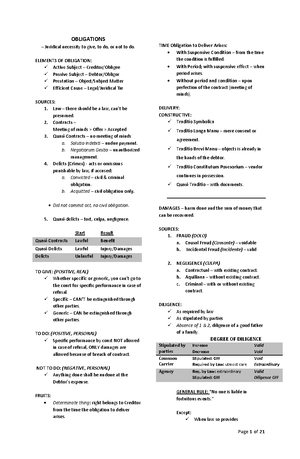- Information
- AI Chat
This is a Premium Document. Some documents on Studocu are Premium. Upgrade to Premium to unlock it.
Was this document helpful?
This is a Premium Document. Some documents on Studocu are Premium. Upgrade to Premium to unlock it.
Toaz - Obligations and Contracts
Course: Obligations and Contracts (LAW20013)
290 Documents
Students shared 290 documents in this course
University: Polytechnic University of the Philippines
Was this document helpful?
This is a preview
Do you want full access? Go Premium and unlock all 8 pages
Access to all documents
Get Unlimited Downloads
Improve your grades
Already Premium?

CONTRACTS
Consensual vs. Real Contracts; Kinds of Real Contracts
(1998)Distinguish consensual from real contracts and name at least four
(4) kinds of real contracts under the present law. [3%]
SUGGESTED ANSWER:
CONSENSUAL CONTRACTS are those which are perfected by mere consent
(Art. 1315. Civil Code). REAL CONTRACTS are those which are perfected by
the delivery of the object of the obligation. (Art. 1316, Civil Code) Examples of
real contracts are deposit, pledge, commodatum and simple loan (mutuum).
Consideration; Validity (2000)
Lolita was employed in a finance company. Because she could not account
for the funds entrusted to her, she was charged with estafa and ordered
arrested. In order to secure her release from jail, her parents executed a
promissory note to pay the finance company the amount allegedly
misappropriated by their daughter. The finance company then executed an
affidavit of desistance which led to the withdrawal of the information against
Lolita and her release from jail. The parents failed to comply with their
promissory note and the finance company sued them for specific
performance. Will the action prosper or not? (3%)
SUGGESTED ANSWER:
The action will prosper. The promissory note executed by Lolita's parents is
valid and binding, the consideration being the extinguishment of Lolita's civil
liability and not the stifling of the criminal prosecution.
ALTERNATIVE ANSWER:
The action will not prosper because the consideration for the promissory note
was the non-prosecution of the criminal case for estafa. This cannot be done
anymore because the information has already been filed in court and to do it
is illegal. That the consideration for the promissory note is the stifling of the
criminal prosecution is evident from the execution by the finance company of
the affidavit of desistance immediately after the execution by Lolita's parents
of the promissory note. The consideration being illegal, the promissory note is
invalid and may not be enforced by court action.
Contract of Option; Elements (2005)
Marvin offered to construct the house of Carlos for a very reasonable price of
P900,000.00, giving the latter 10 days within which to accept or reject the
offer. On the fifth day, before Carlos could make up his mind, Marvin
withdrew his offer.
a) What is the effect of the withdrawal of Marvin's offer? (2%)
SUGGESTED ANSWER:The withdrawal of Marvin's offer will cause the offer
to cease in law. Hence, even if subsequently accepted, there could be no
concurrence of the offer and the acceptance. In the absence of concurrence of
offer and acceptance, there can be no consent. (Laudico v. Arias Rodriguez,
G.R. No. 16530, March 31, 1922) Without consent, there is no perfected
contract for the construction of the house of Carlos. (Salonga v. Farrales,
G.R. No. L-47088, July 10, 1981) Article 1318 of the Civil Code provides
that there can be no contract unless the following requisites concur: (1)
consent of the parties; (2) object certain which is the subject matter of the
contract; and (3) cause of the obligation.
Marvin will not be liable to pay Carlos any damages for withdrawing the offer
before the lapse of the period granted. In this case, no consideration was
given by Carlos for the option given, thus there is no perfected contract of
option for lack of cause of obligation. Marvin cannot be held to have breached
the contract. Thus, he cannot be held liable for damages.
b) Will your answer be the same if Carlos paid Marvin P10,000.00 as
consideration for that option? Explain. (2%)
ALTERNATIVE ANSWER:
My answer will be the same as to the perfection of the contract for the
construction of the house of Carlos. No perfected contract arises because of
lack of consent. With the withdrawal of the offer, there could be no
concurrence of offer and acceptance.
My answer will not be the same as to damages. Marvin will be liable for
damages for breach of contract of option. With the payment of the
consideration for the option given, and with the consent of the parties and
the object of contract being present, a perfected contract of option was
created. (San Miguel, Inc. v. Huang, G.R. No. 137290, July 31, 2000)
Under Article 1170 of the Civil Code, those who in the performance of their
obligation are guilty of contravention thereof, as in this case, when Marvin
did not give Carlos the agreed period of ten days, are liable for damages.
ALTERNATIVE ANSWER:
My answer will not be the same if Carlos paid Marvin P10,000.00 because an
option contract was perfected. Thus, if Marvin withdrew the offer prior to the
expiration of the 10-day period, he breached the option contract. (Article
1324, Civil Code)
Why is this page out of focus?
This is a Premium document. Become Premium to read the whole document.
Why is this page out of focus?
This is a Premium document. Become Premium to read the whole document.
Students also viewed
- 49526180 Multiple Choice Questions in Obligations and Contracts
- LAW279-Assessment-6 - This comprehensive file explores key principles and precedents in contemporary
- LAW279 Exam 10 - This comprehensive file explores key principles and precedents in contemporary
- 1st Yr 1st MT Financial-Accounting-and-Reporting 2223
- Toaz - Obligations and Contracts
- Monetary Policy Chapter 1 4




